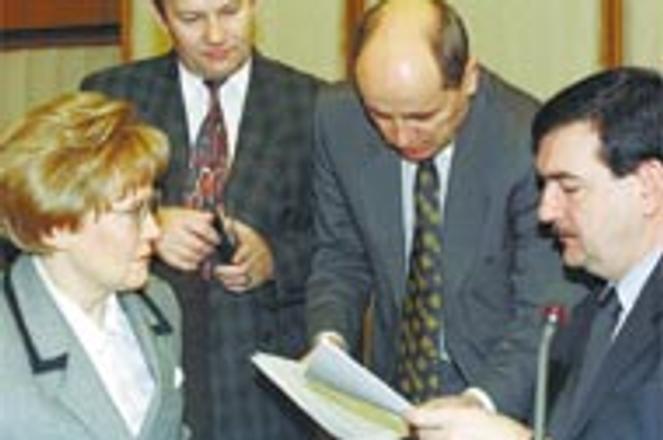The final version. Finance Minister Brigita Schmögnerová (left) debates government programme with Economy Minister Ľudovít Černák (right).TASR
Premier Mikuláš Dzurinda presented his government's official programme to parliament on November 19. The document, which was prepared during three weeks of negotiation between the four parties of the new ruling coalition, proposes to sweep away the political legacy of the former government of ex-premier Vladimír Mečiar.
"The content of the government programme reflects our efforts to repair all that was spoiled during the last four years," Dzurinda said at a November 18 briefing as the cabinet made last-minute adjustments to the text. According to Dzurinda, the programme will not only address the nation's current economic, social, internal security and western integration situations, "it will also revive the rule of law here and will mean a moral revival for the entire society."
The programme document is a 50-page text containing four main chapters - "the democratic legal state," "economic policy," "the social sphere" and "internal security, justice, national defence and foreign policy." According to the Slovak constitution, the government is obliged within 30 days of its formation to submit its programme to parliament and initiate a vote of confidence.
"We cannot call this either a typically left or right-wing document," said Ľubomír Kubín, a political scientist at the Slovak Academy of Sciences. "The programme is very general in spirit, and has two main pillars: an assessment of the current state of the country, including a specific acceptance of responsibility for the situation, and secondly a declaration of intent to solve these problems."
In the document's preamble, Dzurinda's cabinet thanks its predecessor for all the good and positive changes it brought to Slovakia, while at the same time expressing very clearly that Mečiar and his cabinet left the nation in a far worse condition than they found it in 1994.
Among the principal resolutions of the cabinet is a promise to rid society and the state of clientelism and corruption at all levels. The document puts special emphasis on avoiding social antagonism on the basis of political orientation.
Also receiving large mention are the transition to a competitive market economy and the achievement of political plurality, both pre-conditions for the country's accession to European and trans-Atlantic structures.
In economic terms, the cabinet expects to see a general economic slowdown. Domestic demand will decline due to fiscal austerity measures, while foreign demand for Slovak exports is forecast to dry up due both to a world-wide economic recession and the declining competitiveness of Slovak industry.
By the end of its four-year term, however, the government expects to see annual GDP growth of 4-5%, a figure that will be achieved as measures to restructure the banking and corporate sectors and revitalise small and medium enterprises take effect.
Regarding privatisation, the cabinet resolves to publish documents disclosing the cronyism of the former political elite. All privatisation cases that contravened the law will be investigated and sanctioned, according to the programme script.
One of the most serious early criticisms aimed at the programme by analysts was that it was exceedingly short on specifics. "The government programme does not say exactly what tools it will use to solve these problems, giving the impression that they don't yet have a very deep grasp of certain sectors," said Kubín. "Wordings like 'the government will assess...' or 'the government intends to...' give rise to this impression."
Members of the opposition HZDS party also criticised the vagueness of the document. "I wouldn't even call this a government programme, because it doesn't give any specific numbers or data on what the government plans to do," said Gustav Krajči, the former Interior Minister. "The new government clearly wants to shirk responsibility for the promises they are giving. If the programme is complete and transparent, it's easy to check which goals were not fulfilled. But such a general formulation allows for excuses afterwards."
But Istvan Harna, the Minister of Construction and Public Works and a member of the SMK Hungarian minor coalition partner, said that the programme was a compromise between the aims of the coalition parties. "We all made compromises," he said. "Each party had its own programme, but we all had to limit our ambitions. We all now stand unanimously behind this programme."


